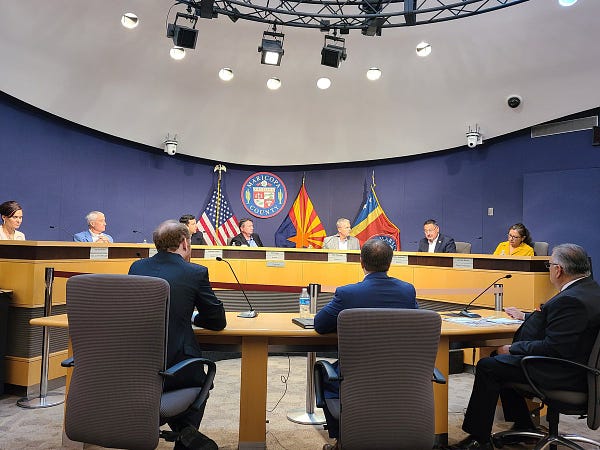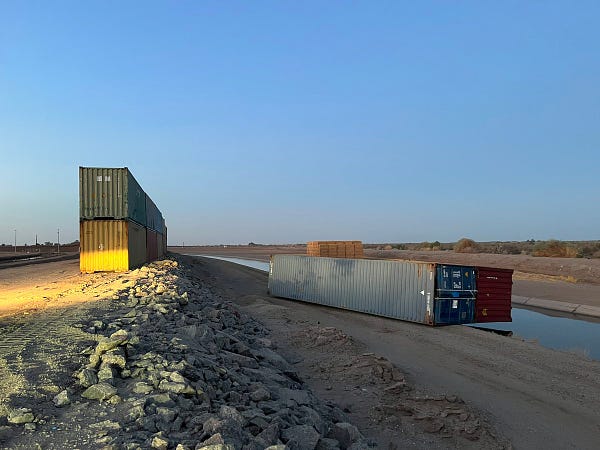The Daily Agenda: It's our birthday!
Not us personally, but the Agenda ... Don't call it a democracy ... Maybe it was the wind.
One year ago today, the Arizona Agenda was born.
Since then, we’ve delivered on our promise to “guide you through the bizarre and the important” and “have a damn good time doing it.”
Our insider’s guide to Arizona politics for political outsiders has become a quintessential morning read for many of you, helping you make sense of all that’s happening in Arizona government and politics, from school boards up to Congress.
Over the past year, we brought you:
One hell of a long read
Investigations about the people running for office and those who help them get elected
Zines about public records and bills becoming law
Scoops on elected officials and big news, like the audit and the state budget
Government accountability, from previous policies to current gimmicks
Insight into the people behind the politics and info on how to get involved
Clear-eyed rundowns of complex policies and how they affect you
Stories focused on the people and places directly affected by policies
Diatribes about the political ads we all hate
Nearly 200 Daily Agendas, including one that talked a lot about eggs
There is, quite clearly, a market for our newsletter — the thousands of daily readers are a testament. At the time we launched, we weren’t sure if there would be.


But we aren’t quite earning the money we need to keep delivering on our mission to get more of you hooked on state politics. (We’ll tell you more about how things on the business end are going in our annual update this Friday.)
We’re here to stay, though. We see a future for the Agenda and a place for it within the local news ecosystem in Arizona. We believe we’re filling a need and serving readers. If you believe that, too, we need your support.
A lot of publications want your dollars these days. Few keep your money in the pockets of local journalists. Now that our initial funding from Substack has dried up, your support will prove crucial to keeping two local journalists in Arizona, covering the issues that matter to your daily lives. The impact of your money here could not be more direct.
You’ll see some changes to help make our business stronger as a reader-supported publication. Today, our annual price will increase to $120. (If you signed up at a lower rate, we won’t automatically increase your rate this year, but if you’d like to opt in to paying the full price, please click here.) You can also become a founding member, which is now set at $500 and will get you subscriptions for four of your friends or coworkers. You can change your subscription type and make sure your card is up to date by following these steps. The majority of our readers who responded to our pricing survey supported these prices, and they reflect the money we need to continue this work.
But because we’re benevolent, you can still get the $100 price for one year using this discount link until Monday. We’d love it if you pay full price anyway, but we get it if you can’t. On Monday, we’ll start using a soft-paywall on the Daily Agenda as well. You’ll hear more about our paywall plans in Friday’s post.
We’re throwing a birthday party as a thank you to all our subscribers in late September in Phoenix. We’ll have more info in future editions, but can’t wait to celebrate with y’all and put some faces to names!
We know we have a long road ahead as we chart out a year fully on our own, as independent journalists and small business owners. But for now, we’re just damn proud we made it this far.
And it’s all because of you.
Today’s edition is too long for your inbox, so click the image at the top of the email or the thing at the end where it says to read more.
We’re #1: The Washington Post dives deep into election-denying GOP nominees for office across the country. Predictably, Arizona has the highest percent of Republican nominees who question the results of the 2020 election. Nationwide, half of the GOP nominees question the results, the Post found. Separately, the Post reports that Donald Trump’s legal team’s efforts to get ahold of voting machines in key swing states went further, and was more successful, than previously reported. While they didn’t — as far as we know — get Arizona’s machines, the Grand Canyon State got a cryptic mention in the story via a message between Jim Penrose, a former intelligence official who is deeply embedded in election conspiracy circles, and the company that did the forensics on the machines.
“Please do not communicate about any additional forensics work in AZ to the other legal teams. Keep that in confidential channels with me, Sidney (Powell), and Doug (Logan) only,” Penrose wrote.
Joe McCarthy for president?: Arizona Republican politicians are hostile to the concept of democracy, and the voters are hostile to the very word “democracy,” preferring “republic” to describe our system of government, author Robert Draper discovers while traveling Arizona for a long-read in the New York Times Magazine.


They allow appeals there?: After Phoenix Mercury star Brittney Griner was sentenced to nine years in a Russian prison, her lawyers appealed the verdict, CNN reports. The appeal comes as Russia and the U.S. continue to discuss a potential swap of Griner and another U.S. detainee for a Russian arms dealer.
The opposite of queer activism: U.S. Sen. Kyrsten Sinema is using her “camp” — an aesthetic style developed by queer activists and effectively employed during the AIDS crisis — to maintain the social order and punch down against those who need her help, former Sinema campaign field director Nathan Kohrman writes in the Washington Post.
Paging Diane Douglas: Kari Lake wants Arizona to adopt the conservative version of the 1619 Curriculum, developed by the private Christian Hillsdale College and dubbed "a more patriotic approach to American history,” known as the 1776 Curriculum, 12News’ Brahm Resnik reports. When former Superintendent of Public Instruction Diane Douglas tried to get the Board of Education to OK a previous iteration of that curriculum that wasn’t big on evolutionism, it didn’t go over well.
Bad news for Blake: The National Republican Senatorial Committee is slashing its TV campaign ad reservations nationwide, including in a couple of key battleground states, the New York Times reports. In Arizona, it pulled about $2 million in airtime reserved for Republican U.S. Senate candidate Blake Masters. Meanwhile, Democrats around the country are using abortion in their ad messages to voters, pointing out their GOP opponents’ stances on the issue, the New York Times reports. In Arizona, ads take aim at Masters and GOP gubernatorial candidate Kari Lake on the issue, calling their claims dangerous.
New holiday just dropped: After Arizona lawmakers made it an official state holiday last year, Arizona celebrated its first-ever National Navajo Code Talker Day on Sunday, the Arizona Mirror’s Shondiin Silversmith reports.
The long road to voting: For voters with disabilities, the process of voting is filled with barriers, from transportation to get an ID, needing accessible voting machines in person and worries over being removed from the voter rolls for inactivity, the Arizona Mirror’s Jerod MacDonald-Evoy reports.
Step 2 as hard as Step 1: Vouchers to help people afford rent are hard to get in the first place, often taking years of waiting for open spots. But once people get them, it’s difficult to find landlords willing to rent to them because some don’t accept the vouchers, some can get higher rent from standard payers and there simply aren’t enough rental options, according to a team of Republic reporters.
You’ll see them outside Changing Hands: As Save Our Schools Arizona works to collect enough signatures to refer the universal expansion of school vouchers to the ballot in 2024, proponents of the voucher program try to spread the word, telling people not to sign the petitions, KJZZ’s Bridget Dowd reports. SOS Arizona has until Sept. 24 to collect about 119,000 valid signatures, which is a quick turnaround and high bar, but the group previously successfully referred a voucher expansion to the ballot in 2018, and won.

You wouldn’t know we have a tight rental market: Another Phoenix City Council candidate may not live in the district she wants to represent. Denise Ceballos-Viner, running to represent the South Phoenix area, lists an address far from the house she owns in Anthem, the Phoenix New Times’ Elias Weiss reports. The home listed as her residence is a small ranch house owned by the parents of Republican House candidate Tatiana Peña. Residency would need to be challenged in court for removal, as an opponent of council candidate Kevin Robinson, who rented a place in Ahwatukee so he could run for office there, is attempting.
It’s not an election without some sign wars: Gilbert City Councilman Scott September, who lost his primary this month, was accused of trying to take signs that opposed him, Gilbert Sun News’ Cecilia Chan reports. There are a lot of layers to the people involved in this one, but we especially love this line, about one of the complainants of the alleged September sign theft: “(Gilbert resident Brandon) Ryff had a beef with the mayor over the density of an apartment project.”
The neighbors can’t be mad if they are no neighbors: An out-of-state developer might buy nearly 150 homes in a Mesa neighborhood and make them all short-term rentals, the Mesa Tribune’s Scott Schumaker reports.
We recommend us: Hank went on KJZZ’s “The Show” yesterday to talk about Florida Man Ron DeSantis’ visit to the Valley. He stumbled his way through trying to explain what Lake meant when she said both DeSantis and Trump have “B.D.E.” since you’re apparently not allowed to say the words “big dick energy” on your local NPR station.
We’ve reached the fifth and final “competitive” district, with Legislative District 16 in Pinal County. Unlike the previous four, this one is only competitive on paper.
When the Independent Redistricting Commission drew the lines for LD16, it met the requirement of party registration split to appear like it would be close, but each of the nine election races used to determine competitiveness went to the Republican candidate.
This district closely resembles the previous LD8, covering the City of Maricopa, Eloy, Coolidge, Florence, and travels southeast, just touching up against Tucson.
Incumbent Republican Sen. T.J. Shope seeks his second term in the upper chamber after serving in the House since 2013. His family owns the grocery store Shope IGA, and he also works for the National Bank of Arizona. He will face Democrat Taylor Kerby, a sixth grade teacher and Casa Grande Union High School District board member.
The House race pits two Republicans against a lone Democrat seeking one of the two House seats. Incumbent Rep. Teresa Martinez, who was appointed last year to fill the seat Bret Roberts vacated in LD11, is a former substitute teacher and staffer for both Paul Gosar and Rick Renzi. Running alongside her is Rob Hudelson, a pastor and Navy veteran. Keith Seaman, the Democrat, is a former longtime rural public school teacher who also served on the Coolidge Unified School Board for a brief time, alongside Shope.
Journalist Claudia Ramos posted a photo on Twitter of Gov. Doug Ducey’s newly constructed “wall” — shipping containers stacked on top of each other — tipped over.
Ducey spokesman CJ Karamargin confirmed the tippage, saying two containers were “knocked down” overnight, then put back in place on Tuesday morning. He said the containers that fell were the only two that weren’t welded and bolted into place, though they are now. They fell around midnight, but Border Patrol asked the state to wait to put them back up because of “high activity” in the area, he said. They were restored around 6 a.m.
It could be the wind, though the containers weigh nearly 9,000 pounds. We’re not sure how they were knocked down. Hank thinks it would be easy; Rachel disagrees. (If you’re the one who did it … just tell us who’s right, we won’t rat you out.)
“We hit a nerve. Someone clearly doesn’t like what we’re doing,” Karamargin said.









In speaking about LD16, you said "Unlike the previous four, this one is only competitive on paper." I would agree that of the five, various measures show this one to be more challenging for Democrats (including winning 0 of 9 previous selected elections, as you mentioned). That being said, if you look at other measures, such as planscore's probabilistic model, it only looks a little less likely for Democrats than a couple of the other 4 "competitive" districts; that model suggested a 1 in 4 chance. (538's probabilistic model in 2016 gave Trump a 1 in 3 chance of winning, so 1 in 4 is far from zero). In contrast, in "safe" districts, the planscore model gives one side <1% chance and the other side >99% chance. And we have a lot of those uncompetitive districts in this state, as you've noted. So LD16 is competitive enough that the usual factors (candidate, campaign, events) can swing the result either way, though "on paper" it will be somewhat tougher for Democrats.
But I appreciate your going through the list of "competitive" districts. Many people made the point to the IRC last year about how important competitiveness was, but that public concern didn't get translated into the outcomes.
Happy birthday!